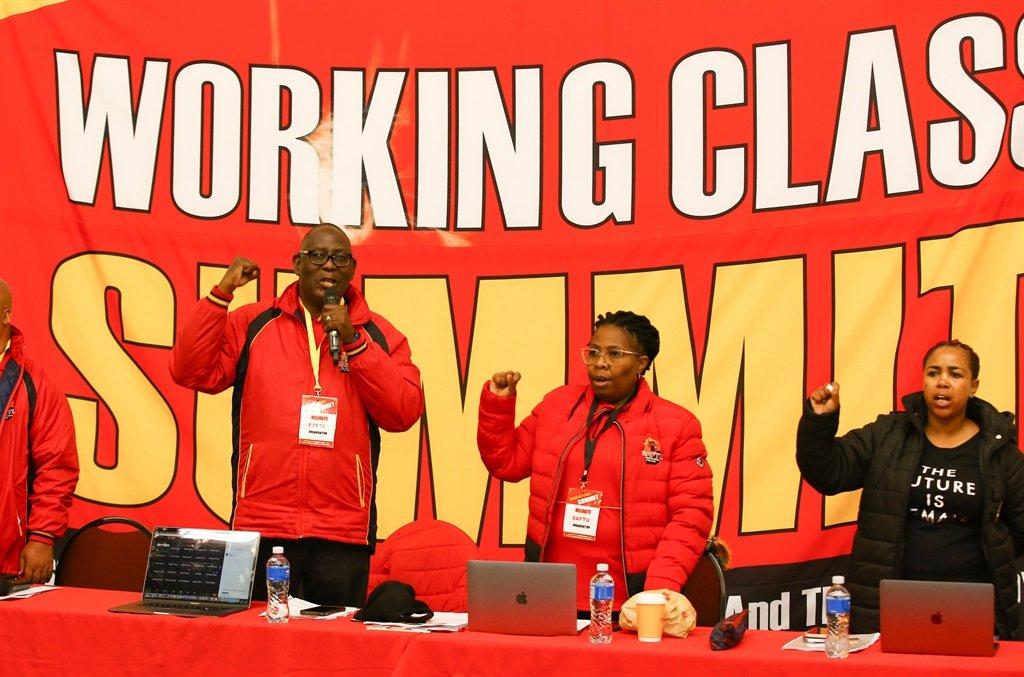Africa-Press – South-Africa. A national strike across the country protesting against the rising costs of living, load shedding, and other economic challenges will take place on 24 August, the leadership of the South African Federation of Trade Unions (Saftu) has said.
This was decided by Saftu at their Working Class Summit in Boksburg on Friday. The national shutdown will see Saftu, its union affiliates, and like-minded organisations protesting nationwide in three weeks. Saftu had an estimated 725 078 individual members in 21 affiliates unions in 2018.
It remains to be seen how successful the national shutdown will be, as the Congress of South African Trade Unions (Cosatu) held such a national strike last year, with little discernable economic effect.
Also complicating the dynamics, Saftu, which comprises unions that left Cosatu after Zwelinzima Vavi was expelled from the ANC-aligned federation, is now at odds with the leadership of its largest member union, the National Union of Metalworkers of South Africa (Numsa).
This was the first gathering of the Working Class Summit since July 2018, where the gathering endorsed a declaration to mobilise on behalf of workers against the “crisis of late stage capitalism”. Since then, the Covid-19 pandemic and continued government failures have worsened economic volatility and eviscerated jobs.
ANALYSIS | The future of SA’s labour movement at stake at critical Saftu conference
Saftu president Ruth Ntlokotse took Numsa to court on Friday seeking a contempt of court ruling after Numsa held a national congress that she successfully had interdicted. She was suspended as Numsa’s second deputy president ahead of the national congress, which elected Puleng Phaka to that position.
Ntlokotse’s suspension was, however, lifted at the eleventh hour as Numsa leadership scrambled to comply with the court order.
Ntlokotse addressed the Working Class Summit on Friday and said the working class faced unprecedented economic pressures from rising costs including the inflation rate, electricity tariffs, fuel prices, and food costs.
She lamented the country’s expanded 45.6% unemployment rate – disproportionately felt among young South Africans – with two million job losses as a result of the Covid-19 pandemic.
“Due to the failed state, our people are under siege. The level of poverty and squalor produced by capitalism makes matters worse for women and children. In Kagiso we saw criminal labour systems exploiting both poor residents and foreign labourers,” said Ntlokotse.
Ntlokotse said Saftu leadership, along with the leadership of affiliates and social partners, had decided to hold a national strike at the end of the month to protest against these economic pressures.
“As a reflection of unity in struggle, we have resolved to begin planning for national mobilisation, specifically on 24 August. We are looking forward to a fruitful and robust engagement as we plan to seek ways to challenge the social ills that confront the working class, to unite our struggles, and to find more inspiring victories,” said Ntlokotse.
Ntlokotse said Saftu declared to work together with other trade union federations, unions, and organisations.
“We need unity on the ground, not just a declaration. We declared that business and government austerity, especially in the public service, will be opposed,” said Ntlokotse.
Irvin Jim accuses Saftu leaders of trying to ‘sabotage’ Numsa’s interdicted congress
Princess Majola from the Assembly of The Unemployed said the expansion of grants from the South African Social Security Agency (Sassa) had become more urgent as unemployment remains stubbornly high. She said the government’s expanded public works programme (EPWP) often did not reach the poorest among South Africa’s youth.
“With plus-minus 11 million unemployed, over 40% being youth and women being forced into unpaid labour, we had to have our president tell us that government does not create jobs, but businesses do. The government is giving EPWP programmes and these do not serve the poorest,” said Majola.
The Climate Justice Coalition’s Alex Lenferna said South Africa was failing to make progress in adding renewables to the grid, despite the renewables being the cheapest form of power in several economies because the government wanted to continue facilitating corrupt non-renewable contracts.
“When we look at the depth of the corruption, we look at the criminal escalation of costs in coal contracts and we look at Medupi and Kusile. The next Medupi is coming in the form of Karpowership which [Energy] Minister [Gwede] Mantashe is trying to push for. We are one of the biggest polluters. The harm of that pollution falls on the poor and the working class,” said Lenferna.
Gabriel Mabitle of #PayTheGrants said with the cost of living rising sharply for low-income households, the grassroots organisation believed that the redistribution of wealth in South Africa had to be implemented through progressive tax systems.
“As #PayTheGrants, we want a universal basic income grant and reject a means test system. The universality is critical, because without it you have to have a means test, and that is akin to asking who is more poor or being asked to prove that you are poor,” sand Mabitle.
For More News And Analysis About South-Africa Follow Africa-Press






